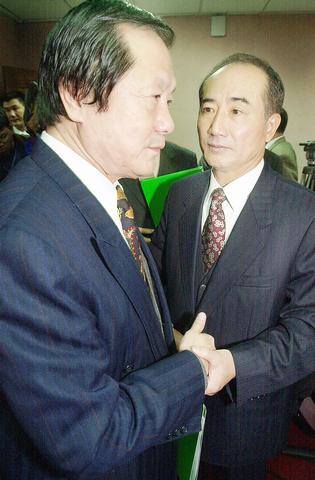With the legislature to elect its speaker and vice speaker today, rival camps made last-ditch efforts yesterday to consolidate support for their candidates amid rumors of defections.
All parties have required their members to cast their vote into separate ballot boxes today to ensure their loyalty.
Incumbent Speaker Wang Jin-pyng (

PHOTO: CHEN CHENG-CHANG, TAIPEI TIMES
He remained mum on whom he preferred as his deputy, though the DPP and the Taiwan Solidarity Union had called on him to take a stand.
At Wang's request, the KMT canceled its weekly Central Standing Committee meeting Wednesday. He termed the move as a "goodwill" gesture to the DPP, which will be the largest party in the legislature.
Analysts say that by calling off the meeting the KMT hinted that members are not bound to vote for the party's vice-speaker candidate Chiang Ping-kun (江丙坤), as he failed to win the official nomination.
Departing from past practice, the main opposition party does not make any threat to punish uncooperative members.
Yesterday evening, KMT Chairman Lien Chan (連戰) personally hosted the party's legislative caucus meeting in which he urged some 60 lawmakers present to throw their support behind Chiang.
"Every single vote counts," Lien told the caucus. "Let's treat the elections of the speaker and vice speaker as an integral campaign." Up to 10 KMT legislators are said to favor DPP candidate Hong Chi-chang (洪奇昌) for vice speaker.
Liu Cheng-hung (劉政鴻), one of the alleged defectors, told reporters he would not make a final decision until Wang secured the speakership. The legislature will elect the speaker in the morning and the vice speaker in the afternoon.
The DPP, itself plagued by the specter of internal revolt on the matter, decided during an eleventh-hour meeting not to challenge Wang. The caucus passed a resolution that binds fellow lawmakers to "technically display" their vote before inserting it into the ballot box.
Incoming DPP legislator Chiu Chang (邱彰) protested the decision as compromising the dignity of the nation's highest lawmaking body.
"How can we expect average citizens to abide by the law when lawmakers take the lead to mock the rules," she said.
Internal election rules bar the displaying of ballots, though members are able to circumvent the regulation through subtle violations.
About five DPP legislators are said to withhold their support for Hong, according to a DPP lawmaker, who asked not to be named.
For his part, Hong went ahead and sought backing from colleagues across party lines. In the evening, he called on independent legislator-elect Sisy Chen (
Chen has made clear her intent to vote for Chiang, while other independents stayed tight-lipped over their voting decisions.
The People First Party, which on Monday entered an alliance with the KMT, also convened a caucus meeting last night in the hope of defusing defection attempts by cash-strapped members.
Scores of lawmakers from all parties are believed to have accepted payments as high as NT$30 million from one camp or the other in exchange for their support.Also See Story:
DPP has yet to decide on supporting Wang

AGING: As of last month, people aged 65 or older accounted for 20.06 percent of the total population and the number of couples who got married fell by 18,685 from 2024 Taiwan has surpassed South Korea as the country least willing to have children, with an annual crude birthrate of 4.62 per 1,000 people, Ministry of the Interior data showed yesterday. The nation was previously ranked the second-lowest country in terms of total fertility rate, or the average number of children a woman has in her lifetime. However, South Korea’s fertility rate began to recover from 2023, with total fertility rate rising from 0.72 and estimated to reach 0.82 to 0.85 by last year, and the crude birthrate projected at 6.7 per 1,000 people. Japan’s crude birthrate was projected to fall below six,

Conflict with Taiwan could leave China with “massive economic disruption, catastrophic military losses, significant social unrest, and devastating sanctions,” a US think tank said in a report released on Monday. The German Marshall Fund released a report titled If China Attacks Taiwan: The Consequences for China of “Minor Conflict” and “Major War” Scenarios. The report details the “massive” economic, military, social and international costs to China in the event of a minor conflict or major war with Taiwan, estimating that the Chinese People’s Liberation Army (PLA) could sustain losses of more than half of its active-duty ground forces, including 100,000 troops. Understanding Chinese

US President Donald Trump in an interview with the New York Times published on Thursday said that “it’s up to” Chinese President Xi Jinping (習近平) what China does on Taiwan, but that he would be “very unhappy” with a change in the “status quo.” “He [Xi] considers it to be a part of China, and that’s up to him what he’s going to be doing, but I’ve expressed to him that I would be very unhappy if he did that, and I don’t think he’ll do that. I hope he doesn’t do that,” Trump said. Trump made the comments in the context

SELF-DEFENSE: Tokyo has accelerated its spending goal and its defense minister said the nation needs to discuss whether it should develop nuclear-powered submarines China is ramping up objections to what it sees as Japan’s desire to acquire nuclear weapons, despite Tokyo’s longstanding renunciation of such arms, deepening another fissure in the two neighbors’ increasingly tense ties. In what appears to be a concerted effort, China’s foreign and defense ministries issued statements on Thursday condemning alleged remilitarism efforts by Tokyo. The remarks came as two of the country’s top think tanks jointly issued a 29-page report framing actions by “right-wing forces” in Japan as posing a “serious threat” to world peace. While that report did not define “right-wing forces,” the Chinese Ministry of Foreign Affairs was